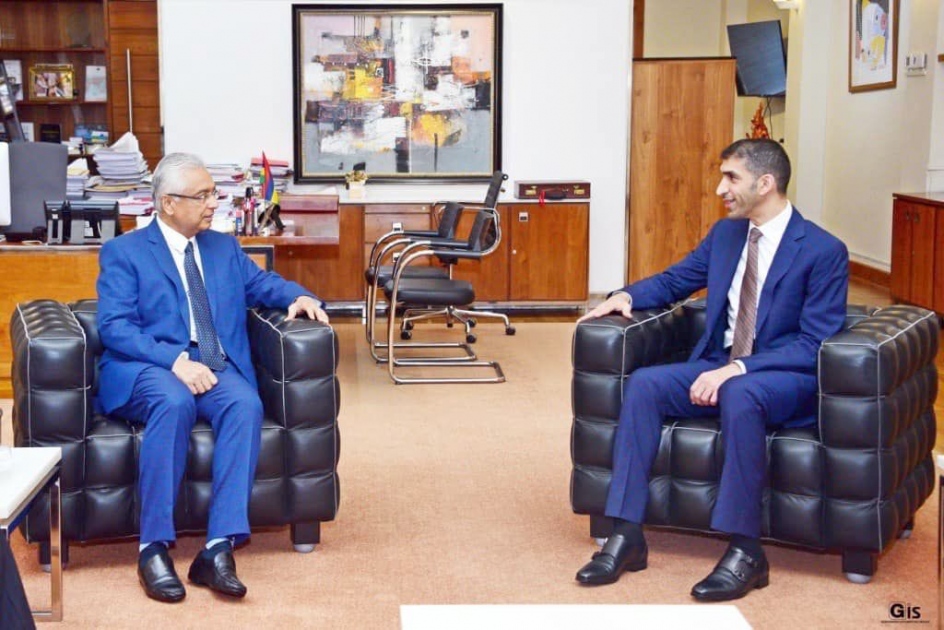
UAE, Mauritius conclude Comprehensive Economic Partnership Agreement
The United Arab Emirates and Mauritius have concluded the terms of a Comprehensive Economic Partnership Agreement (CEPA), marking the first concluded by the UAE with an African nation and paving the way for increased trade and investment flows and bilateral private-sector collaboration.
The conclusion of negotiations, which came just four months following the first round of talks, was confirmed by the signing of a joint statement in Mauritius by Dr. Thani bin Ahmed Al Zeyoudi, Minister of State for Foreign Trade, and Maneesh Gobin, Minister of Foreign Affairs, Regional Integration and International trade of Mauritius.
Building on almost five decades of ties, and more recent foundations including the opening of the Dubai office of the Mauritius Economic Development Board, the CEPA will cover Trade in Goods and Services, Investment Facilitation amongst others. Once implemented, it will accelerate robust growth in non-oil bilateral trade between the UAE and Mauritius, which in H1 2023 stood at US$63.1 million, with opportunities strongest in chemicals, metals and petroleum products sectors.
The Mauritius economy, one of the most promising in Africa, posted 8.5 percent GDP growth in 2022 — the fastest in 35 years. Among others, its services sector, which accounts for 67 percent of Mauritania’s GDP, offers vast potential for UAE businesses specialised in telecommunications, computer and information services, travel, transport, and financial services and who are looking to expand into the Africa region. With inbuilt criteria for the identification and facilitation of targeted investment, the deal is also expected to drive FDI into fintech, healthcare and tourism sectors.
Prior to signing the CEPA joint statement, Al Zeyoudi met with Hemraj Ramnial, Chairman of the Mauritius Economic Development Board, followed by a meeting with the Prime Minister of Mauritius Pravind Kumar Jugnauth, to discuss the various opportunities this bilateral agreement will create to drive trade and investment between the two countries and with Louis Steven Obeegado, Deputy Prime Minister, Minister of Housing and Land Use Planning and Minister of Tourism.
Welcoming the conclusion of negotiations, Al Zeyoudi said, “Strategically located in the vital Indian Ocean, and with a growth-orientated economic vision that matches our own, Mauritius is a welcome and valued partner in the UAE’s CEPA programme and our efforts to maximise bilateral opportunities borne from open, rules-based trade. With the potential to add fully 1 percent to the Mauritius economy by 2031 and enhancing the UAE’s GDP by 1.2 percent in the same period, a UAE-Mauritius Comprehensive Economic Partnership Agreement offers considerable benefits for us both – it will do so by not only boosting trade flows, but creating new pathways for strategic investment, private-sector and academic collaboration, and SME support.”
Maneesh Gobin, Minister of Foreign Affairs, Regional Integration and International Trade of Mauritius, said, “It is expected that the CEPA will further improve the business climate and remove any impediments to trade in goods, trade in services and investment flows. Furthermore, the first CEPA between the UAE and an African country will surely play a pivotal role towards the establishment of joint ventures, movement of professionals and in the strategy of both countries towards their participation in regional value chains. We look forward to working with the UAE to develop and implement such strategies.”
The UAE’s CEPA programme is a key pillar of the nation’s growth strategy, which targets AED4 trillion (US$1.8 trillion) in total trade value by 2031 and doubling the size of the wider economy by 2030. To date, signed deals in the programme span the Middle East, Southeast Asia, Eastern Europe and Latin America – and encompass almost a quarter of the world’s population. The UAE-Mauritius CEPA will enter into force following the successful ratification process by both sides.



























